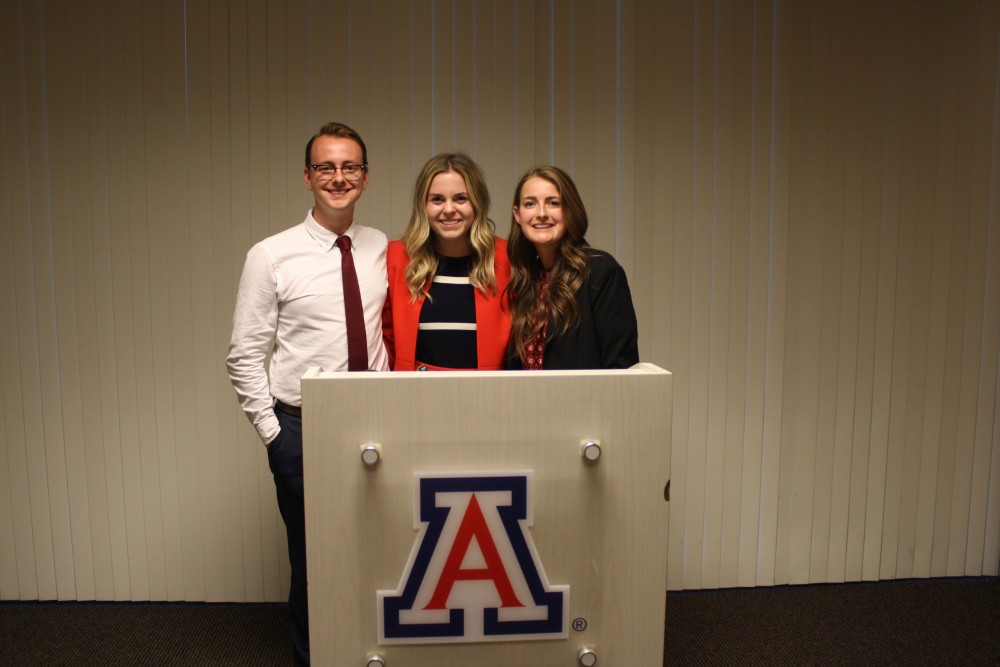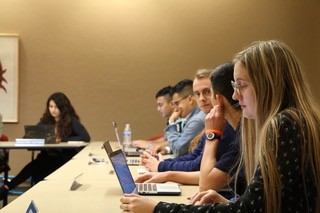The Associated Students of the University of Arizona, UA’s undergraduate student government body, entered its 105th year. During the 2018-2019 academic year, it was under the leadership of President Natalynn Masters, the first black woman to lead the organization.
During her tenure, ASUA promised to focus on increasing student engagement, resources and diversity. Over the last year, ASUA has made significant progress on some of these goals.
Resolutions dominate ASUA legislation
The ASUA Senate passed a number of resolutions during its term.
While resolutions do not carry any legal weight, they help ASUA project their priorities and values to campus and rally support behind communities and certain policy proposals.
When the federal government considered changing the definition of gender to exclude those in the transgender community, Tara Singleton, an outgoing at-large senator drafted a resolution voicing ASUA’s support for the transgender communityon campus, who would be impacted by this national policy.
“[ASUA] will still recognize all gender identities despite the statements and potential actions taken by the federal government. ASUA will continue to offer resources for each and every student on our campus and act as a pillar of inclusivity and diversity,” the statement approved by the Senate read.
In March, the Senate passed a resolution calling on the university to take a number of concrete steps to reduce the cost of textbooks for students on campus.
Most recently, the Senate passed a resolution, introduced by Noah Huang, outgoing senator for the College of Fine Arts, in support of increasing mental health resources on campus.
“ASUA is wholly committed to supporting all students who are facing mental health issues and encourages students to seek support from both our campus and each other,” the resolution read.
ASUA also passed resolutions in support of campus sustainability and expanding safety programs on campus while discussing, but not adopting, others centered on condemning sexual assault and border patrol on campus.
Campus Closet joins Campus Pantry to serve students
Katie Christopher, the outgoing senator for the College of Agriculture and Life Sciences, spearheaded an initiative to make professional clothing available for free to students in need.
The Campus Closet program received funding from the ASUA Senate December 5, 2018, and held its first distribution day February 25.

In the time between receiving funding and the distribution day, Christopher set up donation boxes around campus and collected hangers, steamers and lint rollers.
“I got the idea last May,” Christopher said. “I was thinking of Senate projects I could do that would bring something to ASUA, because the year before I attempted to do some projects, but I didn’t go full out.”
Madeline Melichar, the outgoing senator for the College of Engineering, helped Christopher realize the program.
“She went off of Campus Pantry and how we were helping students in need, but really focusing on how we’re going to get a job and how business-professional attire is really key, but it costs a lot of money,” Melichar said in February.
Campus Closet models itself off another program called Campus Pantry, which provides food to students in need.
ASUA wrestles with low student interest
In ASUA’s general election, hosted in the spring, only four percent of the undergraduate student body voted. Low student interest is not a new challenge for ASUA.
During the 2018 general election that brought Masters to the presidency, many of the positions in the ASUA Senate remain unfilled. This year, while candidates vied for every position but one, most races had only a single candidate,leaving students who did vote with little recourse.
“Of course we certainly want as many candidates to apply as possible, but I always think you should have quality candidates over simply a numerical quantity of candidates,” said Matthew Rein, ASUA’s outgoing executive vice president.
ASUA has promised to further increase its outreach to the student body. Marlon Freeman, the outgoing elections director, hosted a number of campus events to recruit candidates. Some members of ASUA said campus outreach is important but ultimately an uphill battle.
“Some students care about ASUA, others do not,” said Brennen Feder, outgoing senator for the College of Education. “Not even our professors can make 100 percent of students care about their classes.”
Looking forward to a new administration

Lack of diversity in ASUA became a major focus of this year’s executive races.
Sydney Hess, president-elect, Bennett Adamson, executive vice president-elect and Kate Rosenstengel, returning administrative vice president, all ran unopposed.
Lexy Reyelts, co-director of UA’s Pride Alliance, commented during a cultural forum that the student body is not being represented accurately by ASUA.
“There’s no way you’re going to know what we’re going through, and I just feel it’s really disingenuine,” Reyelts said at the forum.
Going forward, Hess said during a Q&A that she wants to be a student advocate.
“What I propose that we do is hold two public town halls per semester and potentially have those in cultural centers, if those cultural centers feel comfortable,” she said at the Q&A. “I think that’s a great way to meet with students and engage with students in a way we haven’t done before.”
Hess aims to increase student advocacy, community and civic engagement and highlight mental health awareness.
She wants to create a liaison position within ASUA that would interact with the Tucson city government.
“I want to work in city government one day, so I think it’s really important to build those relationships outside ASUA,” Hess said at the forum.
Check back to the Daily Wildcat next semester for weekly coverage of UA’s student government.
Follow Randall Eck and Priya Jandu on Twitter









